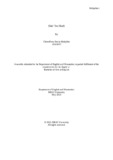| dc.contributor.advisor | Kaiissar, Jahin | |
| dc.contributor.author | Mahjabin, Chowdhury Suraia | |
| dc.date.accessioned | 2023-12-11T04:09:25Z | |
| dc.date.available | 2023-12-11T04:09:25Z | |
| dc.date.copyright | 2023 | |
| dc.date.issued | 2023-05 | |
| dc.identifier.other | ID 19103057 | |
| dc.identifier.uri | http://hdl.handle.net/10361/21945 | |
| dc.description | This thesis is submitted in partial fulfillment of the requirements for the degree of Bachelor of Arts in English, 2023. | en_US |
| dc.description | Cataloged from PDF version of thesis. | |
| dc.description.abstract | Hair Tied Back is a story inspired by Octavia E. Butler’s “The Book of Martha,” a short story about a protagonist who converses with God to come up with a new method of encouraging humans to find joy, hope and determination to continue living. Along with Madeline Miller’s Circe, the downfall of a goddess obsessing over humans and patriarchal validation who experiences her banishment as a journey to selfhood, and the writing style of Fyodor Dostoevsky. The protagonist of Hair Tied Back daydreams as a form of coping mechanism manifested from social anxiety and hyper awareness of the lives around her. The aim of this story is to convey how the world is perceived through female consciousness as well as the cultural superiority established in the minds of Gen Z and the constant flow of content through various forms of media that consciously and subconsciously controls our ways of thinking in this postmodern world. This novella depicts what the world looks like through the eyes of a lower middle class young woman who suffers from her reality and she finds it struggling to function as a social individual. She is troubled by the injustices and lack of representation women have been facing from the community and media since childhood. The protagonist is someone who wants to fight for women, and alongside women but cannot see past her prejudices. As the protagonist adopts a moulded identity whose mind is parallelly aware of the gender dimension, it explores the ideas of existentialism, absurdism and feminist theory. These ideologies are intertwined with two isolated antithetical females on a journey of acceptance. Hera, the Goddess of motherhood, fertility and femininity has been portrayed as the fanatical wife of Zeus, Hercules’s nemesis, patron of suicidal yet glorious quests for heroes to die in the name of the Goddess. Never has a story been popular with her name written in humane descriptions. Her name has always been associated with men, their stories and as a burden they had to overcome. This novella paints Hera in a positive light by portraying her in a journey of growth from toxic femininity which encourages her to find her own path to selfhood. | en_US |
| dc.description.statementofresponsibility | Chowdhury Suraia Mahjabin | |
| dc.format.extent | 51 pages | |
| dc.language.iso | en | en_US |
| dc.publisher | Brac University | en_US |
| dc.rights | Brac University theses are protected by copyright. They may be viewed from this source for any purpose, but reproduction or distribution in any format is prohibited without written permission. | |
| dc.subject | Minority | en_US |
| dc.subject | American exceptionalism | en_US |
| dc.subject | Religion | en_US |
| dc.subject | Existentialism | en_US |
| dc.subject | Feminism | en_US |
| dc.subject.lcsh | Feminist theory | |
| dc.subject.lcsh | Postmodernism | |
| dc.title | Hair tied back | en_US |
| dc.type | Thesis | en_US |
| dc.contributor.department | Department of English and Humanities, Brac University | |
| dc.description.degree | B.A. in English | |

